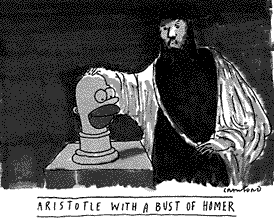Hell is not a Christian invention, though ignorant Atheists might try to say so. Religions from around the world have imagined a realm of divine punishment, and the representations of these ultimate scenes of judgment/punishment speak to a deep need for the Law to be carried out. C. S. Lewis, following the Apostle Paul and the rest of the Great Tradition of Christian thought, points out in Mere Christianity that all people know the Law (and Lewis provides support with the Appendix to The Abolition of Man, in which he lists the varieties of cultures that universally say things like don't steal, don't cheat on your wife). But Lewis goes on to say that no one keeps the Law. And then Lewis takes the next step, the one that we don't like taking because of our fallen nature--we habitually make excuses for why we didn't keep a law. We refuse to repent, in other words.
The Law is engraved on our hearts, but our clouded brains and occluded inward vision keep us from knowing clearly how we have failed, and we--sinful brats that we are--pretend that we didn't do anything that bad or that we didn't do anything bad at all. But we can never escape our guilt and our dodges, so we suppress them. But these suppressions inevitably rise to the surface in mutated ways--hence the visions of Hell in so many cultures.
We know something is wrong with us, but we cannot bring ourselves to see just how bad it is outside of the grace of God that comes to us in the fullness of the Law (Jesus, for instance, on the Sermon on the Mount says, yes you did commit adultery. Yes, you did lie. Yes, you did murder. Every single one of you. Balderdash, we reply. Jesus is just using Semitic exaggeration. He doesn't really mean what he said. We dodge).
Depictions of Hell arise in distorted ways, though, because we want to minimize our own culpability and heighten that of others, so, like the Chinese hell, horrible people--people unlike decent folk--like ourselves--get boiled alive again and again, or torn apart by demons, or are grilled forever. Or mostly forever. One aspect of Buddhist hells is that the torment ends after a certain number of eons, and the sinner is reborn into a new life of destiny. Reincarnation in Eastern religions sometimes is preceded by a billion years in hell with demons who are actually purgative forces of Karma. Though hell still hurts. You can even tour Chinese hell with the kids if you are looking for something to do on a weekend.
So, Muslim hell, Buddhist hell, Shinto hell, Zoroastrian hell--humans with a religious bent build hells because we know deep down that humans deserve judgment. But also deep down, we screen ourselves from judgment, finessing the hard words of Jesus by imagining hell might have a termination of some kind or that we ourselves won't be there, only the really, really wicked people will.
How might this play out in popular culture? One way is that depictions of hell are horribly, horribly wrong, for the most part. Whether it is hell in Constantine, or hell in What Dreams may Come or hell in Jacob's Ladder, the reality of final separation from God, that Love that moves the heavens and the stars as Dante puts it, is deflated by poor theology and the need for entertainment. In some ways, there isn't really a problem with this on one level--movies are fantasy machines that allow us to escape our humdrum lives. The problem comes when someone watches something like Beetlejuice, where hell is obviously a joke, a prop for some Tim Burton-esque fun and so gets reinforcement that separation from the Maker is a residue of primitive belief, something fit only for movie fun; or someone watches something like the sci-fi/horror crossover Event Horizon and thinks that Christians really believe hell is a place of torture and thus cannot in any form or shape be taken seriously.
What might be an antidote to false religious understandings of hell and false pop culture representations? You know the answer to that. The best Christian theology, the best art, and the best literature on the subject. Augustine. Dante. Milton. Lewis. Enjoy watching Homer Simpson in hell. It's just entertainment. Visit the Chinese hell parks. It's interesting culture stuff. But if you want the inside straight dope on what it means, turn to the real experts.

